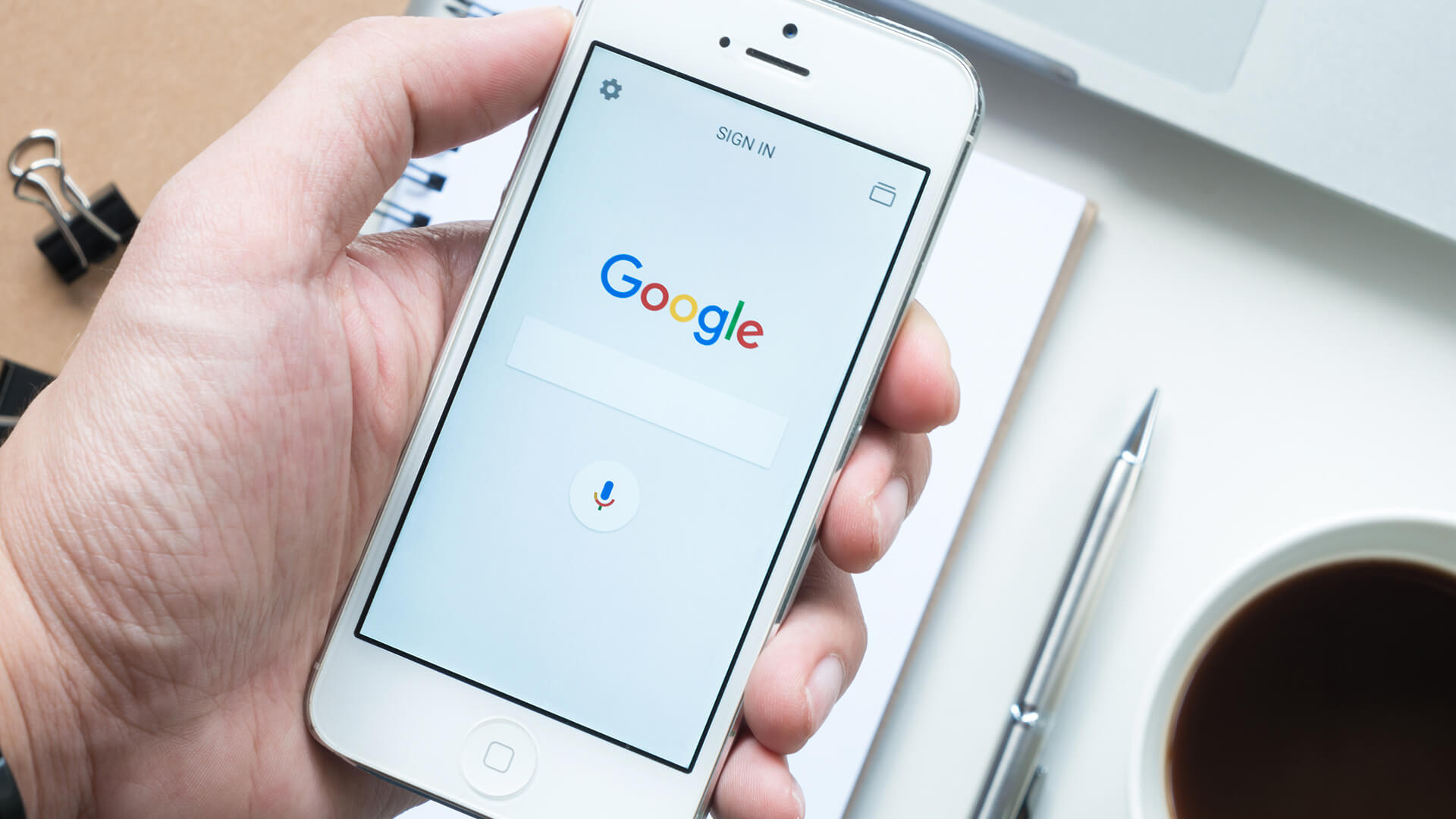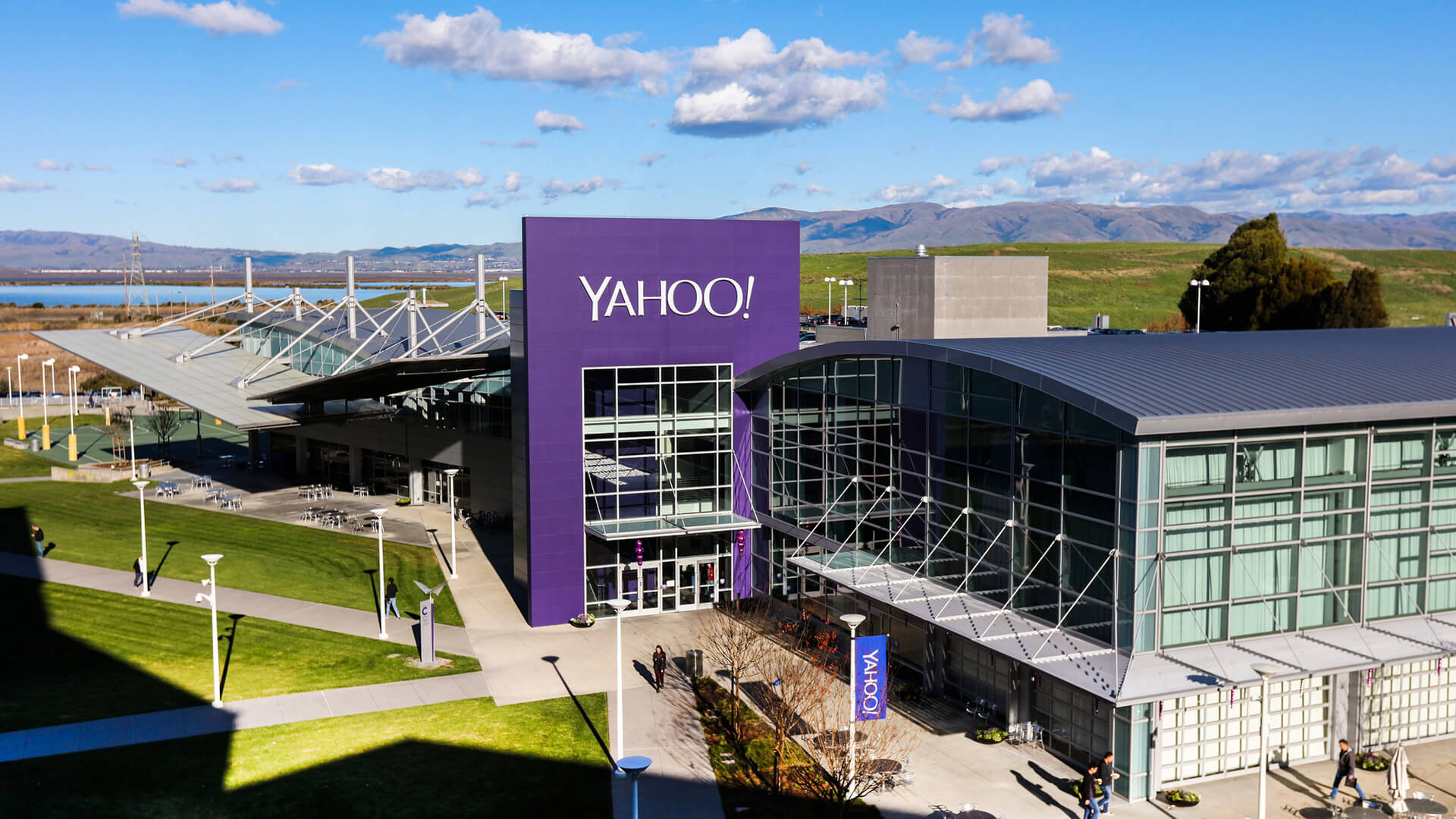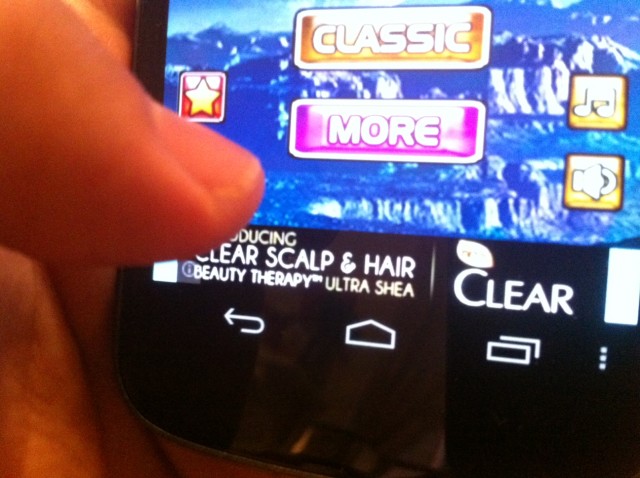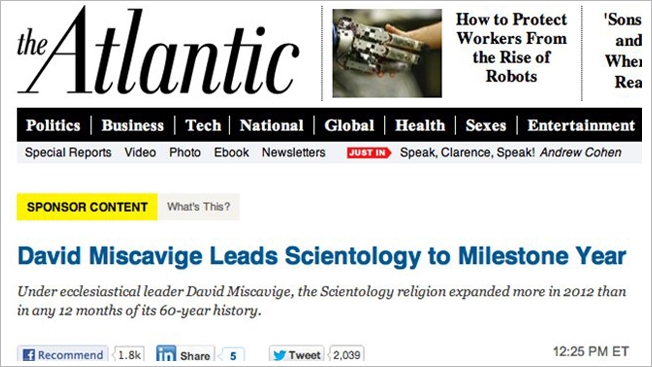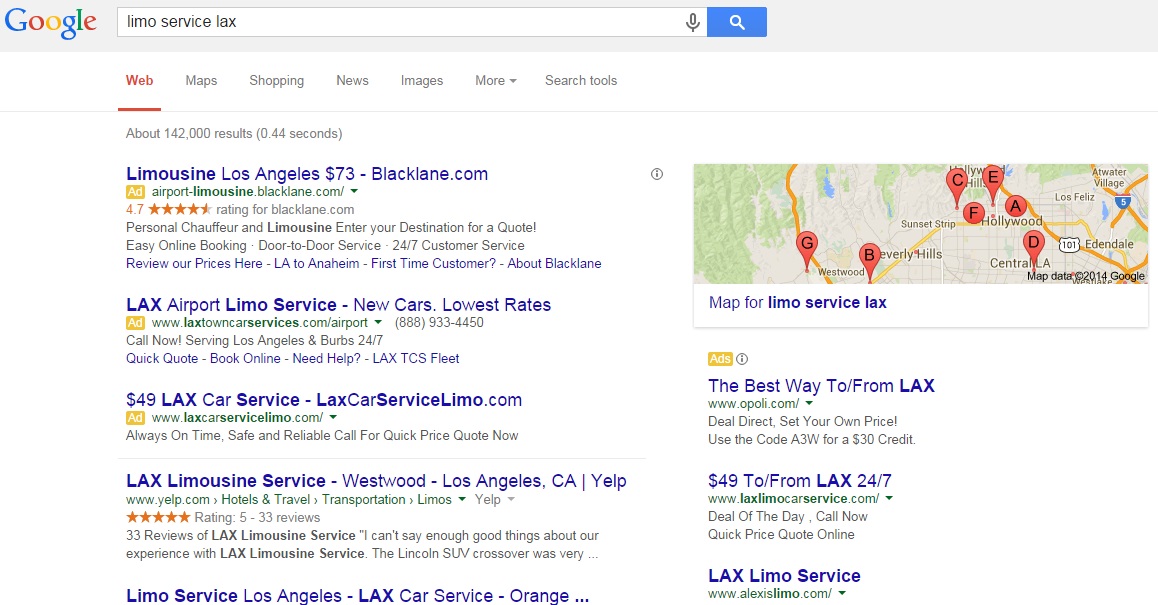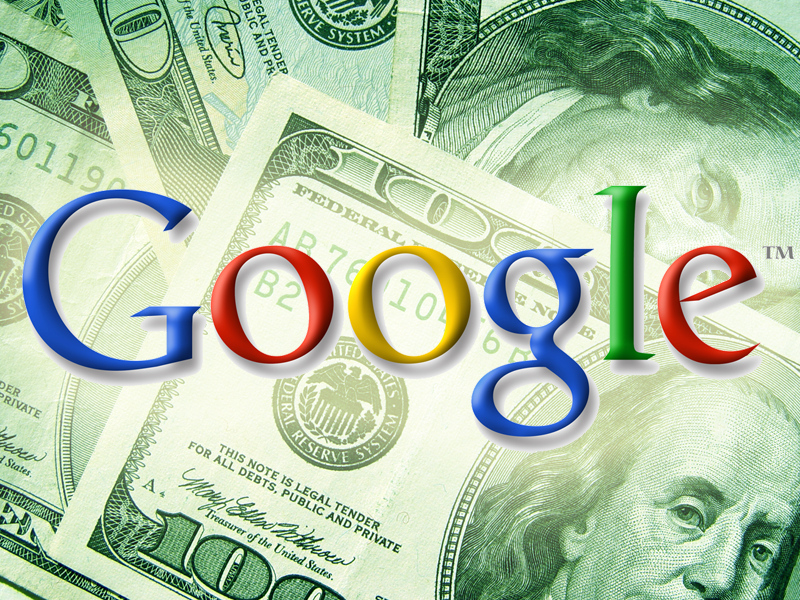Another common mistake (for businesses wanting phone calls). Don’t get tempted to utilize every type of ad extension the search engines offer. The main extension that matters more that all of them is the call button extension. If you utilize every ad extension, they will all rotate in and out. Choose quality over quantity.
I predict within the next 1-2 years, small businesses will get more text messages from potential customers than phone calls and emails. as such, google is about to launch an extension that allows potential customers to text businesses directly right off of google.
Google AdWords click-to-text message extension is coming out of beta
Read Morenot cool yahoo. advertisers will frown upon this when they become aware. i want to advertise with you so google doesnt acquire a complete monopoly. but shortcuts like this dont help anybody.
Yahoo is using display ads to drive search traffic for competitive terms
Read MoreThere’s a lot of people excited about RLSA (remarketing lists for search ads).
But unless you’re a bigger company with a big remarketing list already, it’s something that will take awhile before you can really take advantage of it.
For small business, remarketing works way better with banner ads than search ads.
Why? All the people that go on your website and then are tagged are way more likely to be going on various websites within Google’s display network, than your tagged people will be to go to Google and search for a keyword on your list.
That means way more inventory for remarketing with banner ads than search ads. Which means the cost and effectiveness are way better for banner ads.
In order for remarketing lists for search ads to be effective, you need to have lots and lots of people on your remarketing list. Like at least a couple thousand people.
Otherwise, you’ll get RLSA set up and be wondering why it’s not working.
Just wanted to pump the brakes for people reading up on it and thinking it’s going to work right away like some writers make it seem like.
Read More
There’s a big problem with banner ads right now, when it comes to trying to get leads.
The problem? Accidental clicks. But especially on mobile devices.
I don’t have evidence, but my very educated guess is that a majority of clicks on banner ads with mobile devices is accidental.
And that’s the number one reason right now that if you use banner ads to try and get sales leads, you’re not getting them. The clicks you’re paying for are not legit.
When I use banner ads, it’s only for branding purposes. I pay CPM (cost per 1,000 views), so when the accidental clicks happen, it doesn’t hurt the campaign.
I’d bet the only businesses that pay per click with banner ads are either giant companies looking to get as many clicks as possible and have giant budgets so they don’t care if there’s some junk mixed with their ad spend. Or businesses that don’t know what they’re doing (either people that think banner ads get leads or people that don’t know how to opt out of the banner ad network).
Why does this keep happening? Because publishers (websites that sell ads), in a lot of cases get paid by the click and they want the accidental clicks to happen because they make more money. A lot of publishers purposefully try and place the ads on their websites in a way where a lot of people will accidentally click them.
The search engines, namely Google (cause Bing and Yahoo copy what Google does), needs to crack down on this because banner ads should be more effective than they are.
Banner ads will never reach their full potential until the publishers are unable to do this.
Read MoreI haven’t written anything in awhile. 2nd kid being born in March. Moved my family from California to northern Virginia. But I’m back!
Wanted to opine on an article by Larry Kim. The premise of what he wrote is that it’s all about collecting cookies.
For those not familiar with cookies or remarketing: person goes to a website. The website can then drop a piece of code, known as a cookie, in the device of the user, so that whoever operates the website can stay in touch with user through serving banner ads. In other words, if you’ve ever been on Amazon, looking for a product. And then you leave. And then you start seeing banner ads pop up all over the internet for what you were just looking for, that technique is called remarketing.
Couple things I’d point out about what Larry wrote.
He makes it seem like everybody can do RLSA (remarketing lists for search ads). But you need a really big remarketing list to do it. Like at least a couple thousand cookies.
Why? Because the people on your remarketing list aren’t going to do searches all the time for what your business does.
But it’s easy and common to serve banner ads to people when they’re on various websites.
I’d also point out the idea of getting cookies with social ads is only for businesses in high CPC industries like legal, financial, insurance, etc.
So what’s the most low cost way to acquire cookies?
In my experience, it’s probably banner ads through Google’s display network, paying by CPM (cost per 1,000 views).
Let’s say a banner ad click costs $2. I’ve found that with all the impressions I get for $2, it’s almost always 2 clicks or more. Thus for my $2: CPM > CPC
But there’s another HUGE reason why we do banner ads with CPM and not CPC.
About 60% of internet users are mobile, 40% desktop computer. And there are big problems that remain unsolved for mobile banner ads. Fat fingers (aka when the buttons on the website are too small). And ad publishers that deliberately try to get accidental clicks (trying to collect those Google Adsense checks).
This means a whole bunch of wasted money.
But when you pay by CPM, it’s not a probem cause you’re paying by the view and not the click. So the accidental clicks don’t matter. Only thing that matters is getting those 1,000 views.
And if the banner ad can be a little creative with an offer like: “Book 5 trips and get a ride to LAX Airport for free”, you could get even more clicks for the same CPM price.
On a side note, I’ve found that 10% off and stuff like that isn’t as effective because it’s not tangible and a lot of people are skeptical of the deal cause they think the business will just jack up the regular price.
Another side note, despite the privacy concerns consumers are having over being “tracked”, I think remarketing will survive. When a lot of people hear the word “tracked”, they picture being spied on. When in actuality remarketing is just giving advertisers the ability to serve custom advertisements. Which surveys have shown people prefer custom advertisements tailored to what they like versus generic ads.
In summary, remarketing is a must. And it’s probably the future of internet marketing.
Not sure? Imagine getting your remarketing list up to 1,000 people. Or 10,000 people. Or even 100,000 people. Been on your website before. They had/have an interest in what you do. And they know you because they see your ads all over the internet. And they might think your company is a big deal because you advertise seemingly on every website!
Thus the future of internet marketing might not be so much as, “Hey, let’s get as many calls as we can out of these $5 search engine clicks.”
It might be more like, “Hey, let’s squeeze as many calls as we can out of the 7,560 people we’re serving banner ads to from our remarketing list.”
Read MoreWe haven’t tested this out yet, but it has the potential to be a really big deal.
Facebook is now including a call button in their banner ads on facebook.com.
It’s a big deal because there’s a way big inventory of advertising space through banner ads on websites throughout the internet as opposed to ads on search engines.
The banner ads are always less expensive per click. But they haven’t been as effective in producing phone calls.
The reason is because search engines advertise by intent. Someone does a Bing search and they type “sedan service jfk”, they have intent to make a reservation with a sedan service company to take them to JFK Airport in New York.
But banner ads advertise by people. Meaning you can set the banner ads to be targeted to fit different demographics like age, gender, job, interests, etc. But just because you advertise to people that are the type of people your customers are, it doesn’t mean they have intent or a need for your product or service.
However! If advertisers can pay for someone pushing on a call button on the banner ad, that changes everything!
That means instead of paying for 10 banner ad clicks and maybe getting 1 phone call, you could pay for 1 push on the call button and get 1 phone call.
Google has already rolled out call buttons on their search engine ads. My bet is that the Facebook ads are less expensive per push on the call button.
Meaning there’s potential for more phone calls for clients without having to charge more money.
Exciting times!
Read MoreNot familiar with native ads? Native advertising is known when there are ads on a website that look like part of the website publisher’s content, but it’s an advertisement instead.
For instance, if you go on espn.com and you see a bunch of picture sqaures at the bottom of the story you’re reading that have headlines about who the wealthiest athletes are, what weight loss techniques athletes use, the best looking wives of athletes, etc, then you have seen native ads.
They look like they’re a part of espn, but they’re ads and when you click on them, you go to the advertiser’s website.
The internet marketing industry is split on the effectiveness and ethical merit of this technique, but regardless, Bing and Yahoo are launching a native ad product to small businesses. The native ads will function as part of their banner ad product.
The downside in the current moment is the lack of control that the advertiser has. Essentially Bing’s algorithm will determine which website publishers are a fit for your company’s native ad.
Advertisers and publishers are always trying to figure out how to make more money off their ads and the point of the native ads is to increase phone calls and other conversions from banner ads.
My opinion is that it’s possible the native ads could help the banner ad product, but it doesn’t change that the biggest potential of banner ads is including a “call button” where advertisers dont pay for a click or thousand views, they pay for someone pushing on the call button on their cell phone.
Read MoreTake note. For those business owners out there that think that there’s only 10 main keywords to target, your paradigm is about to change.
According to research done by KO Marketing, at least 50% of all searches done on Google, Yahoo, and Bing are 4 words or more.
Meaning that 50% of searches are not just “auto repair” or “flooring”. They’re 50% as likely to be “who does nissan brake repair ashburn virginia” or “average price of walnut wood flooring dallas tx”.
The search engines consider each combination of words to be known as a “keyword”. And if you change just one letter in the combination, they consider it a different “keyword” which is going to produce a different list of businesses that pop up on the first page.
The lesson here is that there are litterally an infinite amount of different keyword combinations potential customers could search for.
Each keyword is like a billboard and the more billboards you’re marketed on, the better. The goal is to pop up on the 1st page of a search engine for as many keyword combinations as possible.
Read MoreYears ago, Google used to have 82% market share, according to ComScore.
Meaning that 82% of all searches to a search engine went to Google.
Now the latest ComScore report has Google at 65% while Bing/Yahoo is at 33% (Bing aka Microsoft runs Yahoo’s search engine for them).
Most people aren’t stupid. They see that Google is becoming more and more like a classified section in a newspaper. It’s becoming nothing but ads.
My prediction is that because of constant shenanigans, that Bing and Yahoo will become more popular and more widely used.
The reason why Google triumphed over all the other search engines like Hot-Bot, Alta Vista, Ask Jeeves, etc is because their brand became, “we have the best organic results and best content”.
I think Google is being too short-sighted. probably under pressure from stockholders to grow profits right now.
But they’re losing their brand.
Google was once beloved in the webmaster, seo communities. Now they’re becoming despised.
I really think more and more people will start to see what Google is. A website with advertisements. That’s what Google is turning in to.
And i think more people will turn to Bing and Yahoo as viable alternatives.
Read More

